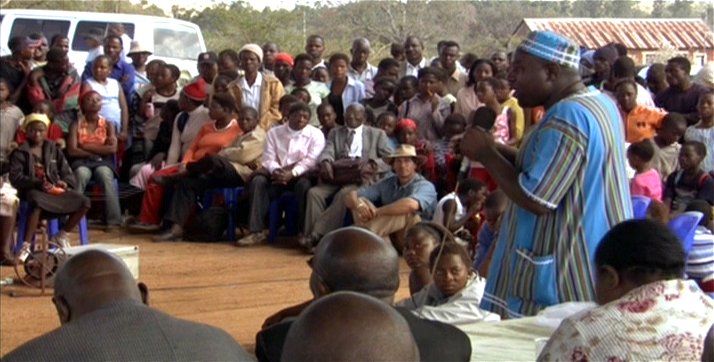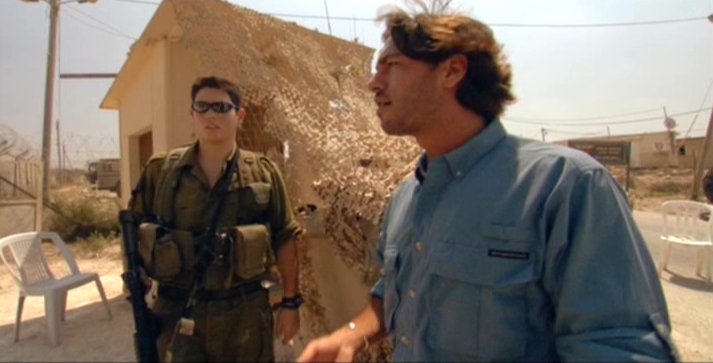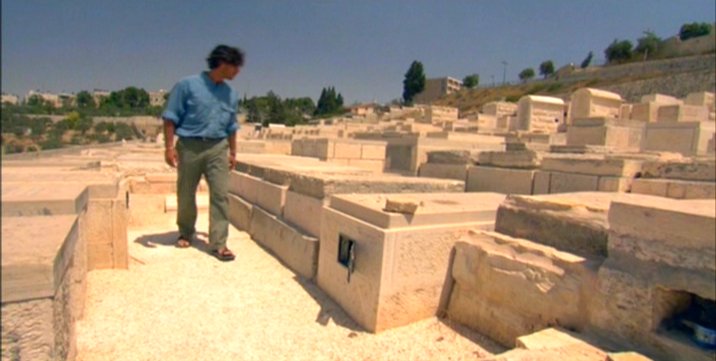The Lost Tribes of Israel
The mystery of the 10 Lost Tribes of Israel has fascinated people through the ages. Explorers claim to have discovered evidence of them from Australia to Siberia, but few claims have been backed up by solid evidence. Now a provocative possibility about the whereabouts of one of the tribes has emerged in Southern Africa. Host and explorer Josh Bernstein retraces the amazing journey that the Lemba people claim they made centuries ago. As Josh discovers, recent DNA studies suggest that the Lemba's remarkable tales might be true.
The Lost Tribe of Israel
 The Lemba, a Lost Tribe of Israel?: "As viewers will learn during this episode, I'm Jewish (as if the name 'Josh Bernstein' wasn't enough of a clue). My father was born in the Old City of Jerusalem and I have spent a lot of time both living in Israel and learning about my heritage. Yet, despite this background, I never heard of the Lemba before investigating this story. Nor have I really spent much time exploring the mysteries of the Lost Tribes and what their 'discovery' might mean. But apparently, a lot of other people have, and 'lost tribes' have been found all over the world—in Asia, India, Central America and South America, to name a few. Once I got up to speed on the research, it was really fascinating to learn how certain groups trace their heritage back to Israel before the Assyrian invasion in the 8th century B.C."
The Lemba, a Lost Tribe of Israel?: "As viewers will learn during this episode, I'm Jewish (as if the name 'Josh Bernstein' wasn't enough of a clue). My father was born in the Old City of Jerusalem and I have spent a lot of time both living in Israel and learning about my heritage. Yet, despite this background, I never heard of the Lemba before investigating this story. Nor have I really spent much time exploring the mysteries of the Lost Tribes and what their 'discovery' might mean. But apparently, a lot of other people have, and 'lost tribes' have been found all over the world—in Asia, India, Central America and South America, to name a few. Once I got up to speed on the research, it was really fascinating to learn how certain groups trace their heritage back to Israel before the Assyrian invasion in the 8th century B.C."
Jewish vs Hebrew: "This is an important distinction to understand—the Lemba do not consider themselves Jewish but rather descendents of the ancient Israelites. They are Hebrews, since Jews and Judaism didn't appear until after the invasion which sent the 'Lost Tribes' into exile. In a community of African t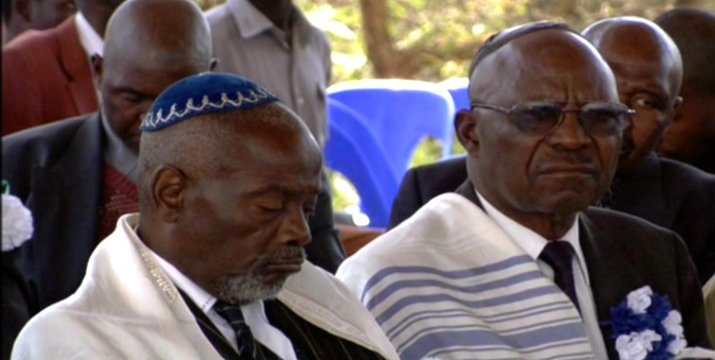 ribes which practice very different religious beliefs, the Lemba today have kept certain traditions which are Hebraic in origin."
ribes which practice very different religious beliefs, the Lemba today have kept certain traditions which are Hebraic in origin."
Lemba Traditions: "The Lemba do not mix milk with meat. They do not eat pork. They circumcise their men. They keep one day a week holy as a Sabbath. They believe in one God. They are endogamous—marrying within their people to maintain their cultural identity despite pressures from neighboring tribes."
"But there are some distinctions—for example, they circumcise their boys at 8 years old, instead of the Jewish custom of 8 days. Yet if the Lemba did indeed escape from Israel before 722 B.C., there is no reason to think they should have the same customs as those who lived under Rabbinical Judaism in the centuries following. Their branch of the tree, so to speak, left the trunk of Israelite culture before modern Judaism was born."
Machema: "The stone cities the Lemba claim to built are scattered throughout Africa and go up through Yemen. The first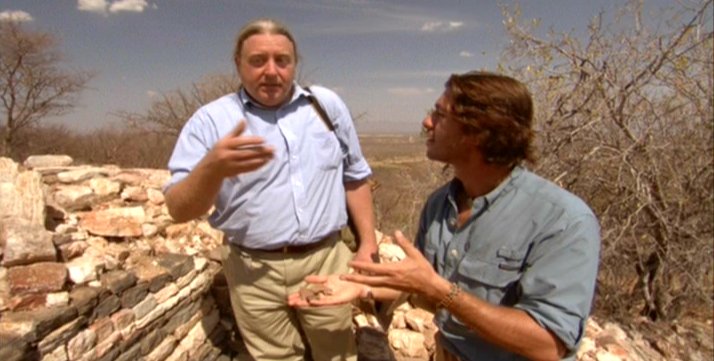 one I'm going to see is Machema in northern South Africa, not too far from where the Lemba currently live. Richard Wade immediately points out an inscription on the rock wall—this was hard for me to see at first. It's the contrast between white and black rock that produces the letters or symbols which Richard says demonstrate a connection between this site and other sites which archeologists have shown were Lemba-built."
one I'm going to see is Machema in northern South Africa, not too far from where the Lemba currently live. Richard Wade immediately points out an inscription on the rock wall—this was hard for me to see at first. It's the contrast between white and black rock that produces the letters or symbols which Richard says demonstrate a connection between this site and other sites which archeologists have shown were Lemba-built."
Zimbabwe: "The Great Enclosure at Great Zimbabwe was built about 600 years ago. The question is 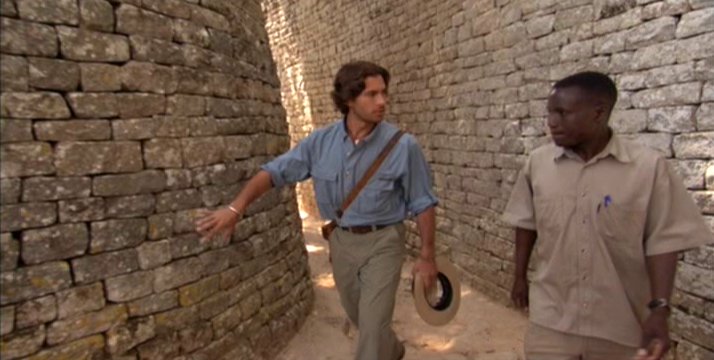 who built it? The Lemba claim to have been the builders, but as Edward Matenga points out, the Shona believe they built it, and some archeologists tend to support this belief. But it is possible that the Lemba were part of the larger Shona community, bringing with them the rock-cutting specialty skills which went into this and other Lemba sites. If this were the case, it would be true that both the Shona and the Lemba built this site."
who built it? The Lemba claim to have been the builders, but as Edward Matenga points out, the Shona believe they built it, and some archeologists tend to support this belief. But it is possible that the Lemba were part of the larger Shona community, bringing with them the rock-cutting specialty skills which went into this and other Lemba sites. If this were the case, it would be true that both the Shona and the Lemba built this site."
The Armored Truck: "I rented this vehicle to get into the Occupied Territories/West Bank of Israel. In case you're wondering, yes the front of the vehicle is armored as well, so I'm perfectly safe sitting up front with Itzhak while the crew sits in the back. My goal is to get to Shomrom/Samaria to explore one of the archeological sites which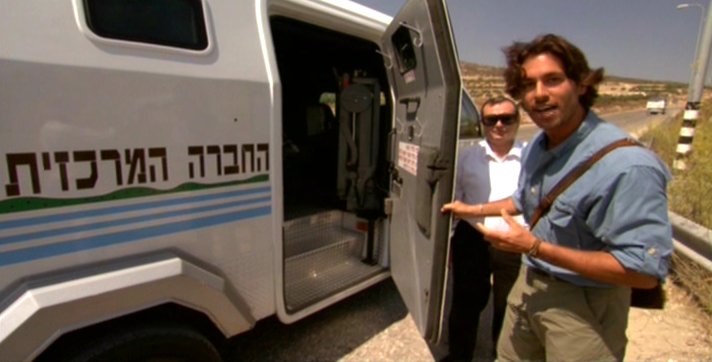 may support the presence of the Lemba. Unfortunately, despite weeks of working with the Israeli security officials, our plans to access the site fell through on the day we drove there. So on to Plan B."
may support the presence of the Lemba. Unfortunately, despite weeks of working with the Israeli security officials, our plans to access the site fell through on the day we drove there. So on to Plan B."
Megiddo: "For a place that is supposed to serve as the site of the world's final battle, Armageddon is actually quite nice. I can easily imagine this Northern Kingdom outpost governing a far-reaching mini-empire and effectively leading their people. But the question which I'm here for—whether or not the Lemba left any archeological evidence behind—is not easily answered by the remains of this city. So it's back to South Africa."
DNA Testing: "This is where things get a bit 'CSI.' Johannesburg geneticists Trefor Jenkins and Himla Soodyall have spent decades analyzing the DNA of the Lemba, Bantu and Venda tribes. What they found is that a certain group of the Lemba priests—called the Buba—have a certain Y chromosome pattern called the Cohen Modal Haplotype. This pattern shows up in the priestly class of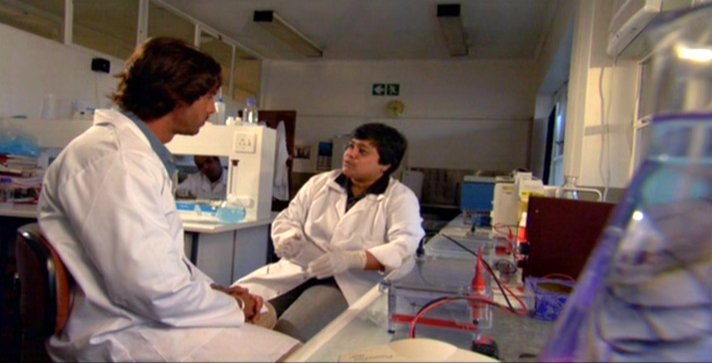 the Jewish people elsewhere in the world, suggesting a potentially strong link between the Buba/Lemba and semitic people elsewhere. This is fascinating. Himla was kind enough to do a DNA test on me, too, since my mother's family is from the Cohen or priestly class. Unfortunately, I do not have the Cohen Modal Haplotype, which makes sense since the Y chromosome is passed through the father. This is particularly interesting to me, since Judaism is traditionally passed through the mother's line, while the priestly class within Judaism is passed through the father. It makes one wonder what was known about Y-chromosomes in the past and how well tradition is supported by modern science."
the Jewish people elsewhere in the world, suggesting a potentially strong link between the Buba/Lemba and semitic people elsewhere. This is fascinating. Himla was kind enough to do a DNA test on me, too, since my mother's family is from the Cohen or priestly class. Unfortunately, I do not have the Cohen Modal Haplotype, which makes sense since the Y chromosome is passed through the father. This is particularly interesting to me, since Judaism is traditionally passed through the mother's line, while the priestly class within Judaism is passed through the father. It makes one wonder what was known about Y-chromosomes in the past and how well tradition is supported by modern science."
Back to the Lemba: "As fate would have it, I am near the Lemba village of Louis T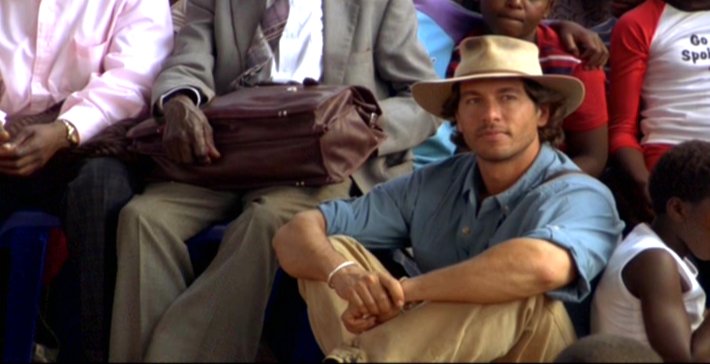 richardt during their annual festival, where they celebrate their 'Lemba-ness' and teach their traditions to the next generation. In a community of about 80,000 Lemba, 1000 or so have shown up for the celebration, eating, dancing, singing, and praying together. As I said to Samuel at the end, theirs was an epic journey through many lands over many centuries, and my thoughts on that journey can truly be captured in just the one word 'Shalom'."
richardt during their annual festival, where they celebrate their 'Lemba-ness' and teach their traditions to the next generation. In a community of about 80,000 Lemba, 1000 or so have shown up for the celebration, eating, dancing, singing, and praying together. As I said to Samuel at the end, theirs was an epic journey through many lands over many centuries, and my thoughts on that journey can truly be captured in just the one word 'Shalom'."
